八年级下册语法专题一:情态动词should与
- 格式:doc
- 大小:16.00 KB
- 文档页数:2
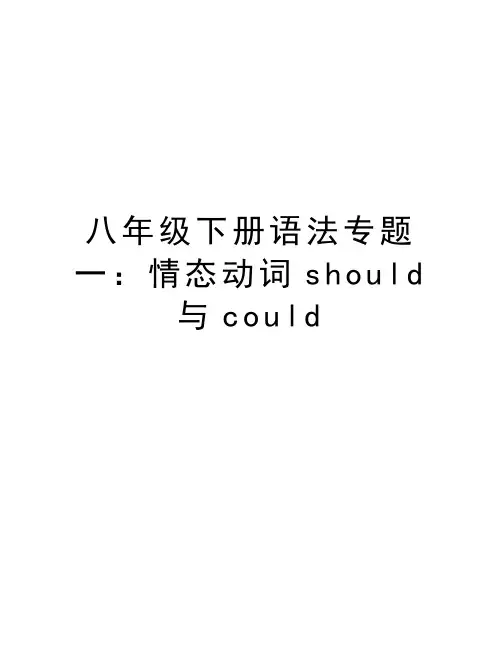
八年级下册语法专题一:情态动词s h o u l d与c o u l d专题归类复习一情态动词should与could的用法●语法讲解1.should是情态动词shall的过去式,但有时并不表示过去。
(1)表示委婉的劝告或建议,意为“应该”。
如:You should hand in your composition at once.你应该立刻交上你的作文。
(2)表示可能性或推断,意为“可能;应该”。
如:I think they should be there now.我想他们现在应该在那里。
(3)用于特殊疑问句中,表示意外、惊奇、不能理解等强烈感情。
如:How should you know that?你是怎么知道那件事的?What should you do to relax?你该做什么来放松呢?2.could是情态动词can的过去式,但有时并不表示过去。
(1)表示提议,比can更客气、委婉。
I could do the shopping for you, if you are tired.如果你累了,我能帮你买东西。
(2)表示请求,语气比can更客气、委婉。
Could you show me the way to the hospital?你能告诉我去医院的路吗?●语法精练Ⅰ.单项选择( )1.Schools________allow students at least one houra day for sports.A.would B.mightC.should D.could( )2.________you tell me how to get to the postoffice?A.Must B.NeedC.Could D.Should( )3.—When can I come for the photos? I need themtomorrow afternoon.—They________be ready by 12:00.A.can B.shouldC.might D.need( )4.—Could I borrow your dictionary?—Of course you________.A.can B.mustC.should D.will( )5.The basketball________his.He loves playingbasketball.A.maybe B.may beC.may is D.may not( )6.We________keep the new traffic law and learn how to protect ourselves.A.will B.wouldC.shall D.should( )7.—Could you please help me do my homework?—Sorry.I________.You________do it by yourself.A.could; mayB.couldn't; shouldC.can't; shouldD.can't; may( )8.—How was the youth club last night, Mark?—It was great fun.You________come.A.must B.canC.should D.mayⅡ.根据句意用should或could填空1.Sally________make dumplings by herself when she was only five years old.2.In school, all the classmates__________get on wellwith each other.3.You________call her if you have something important to tell her.4.You_________not drive after drinking.5._________I use your mobile phone,please?。
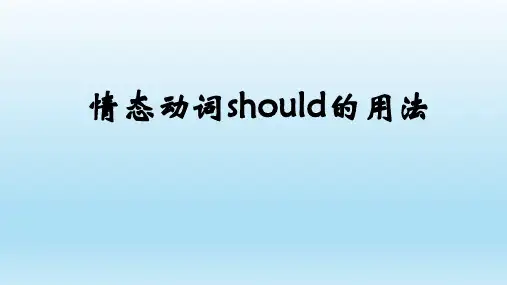
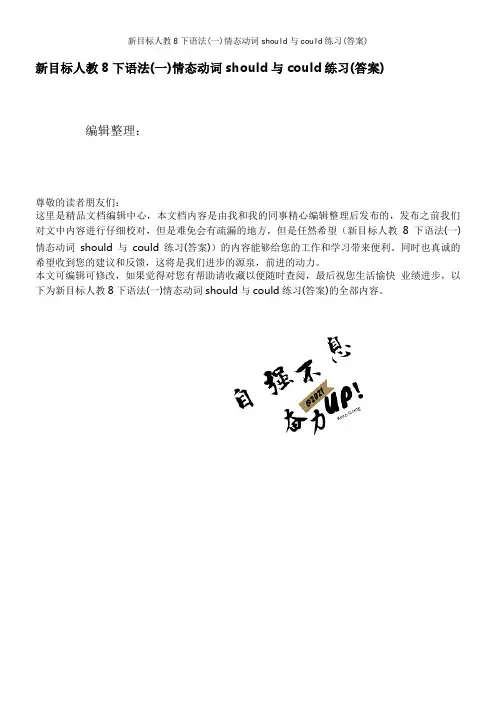
新目标人教8下语法(一)情态动词should与could练习(答案)编辑整理:尊敬的读者朋友们:这里是精品文档编辑中心,本文档内容是由我和我的同事精心编辑整理后发布的,发布之前我们对文中内容进行仔细校对,但是难免会有疏漏的地方,但是任然希望(新目标人教8下语法(一)情态动词should与could练习(答案))的内容能够给您的工作和学习带来便利。
同时也真诚的希望收到您的建议和反馈,这将是我们进步的源泉,前进的动力。
本文可编辑可修改,如果觉得对您有帮助请收藏以便随时查阅,最后祝您生活愉快业绩进步,以下为新目标人教8下语法(一)情态动词should与could练习(答案)的全部内容。
新目标人教8下语法(一)情态动词should与couldⅠ.单项选择1. 。
(2017。
安徽第四次月考题)I think you ______ to go to the hospital at once。
A. shouldB. mustC. needD. could2。
(2017.山东德州庆云县二中收心题)You ______ drive your car so fast. It's very dangerous.A。
wouldn’t B。
shouldn’t C。
couldn’t D。
mightn't3. (2017.辽宁灯塔期中题)— I have a sore throat.— You ______ drink more hot tea ______ honey.A。
. should, has B。
. should, withC。
. need, has D。
. need, with4. (2017. 山东东营广饶县英才学校月考题)— Could I borrow your MP4?— Yes, of course you ______。
A. can B, could C. should D。
are5. (2017。
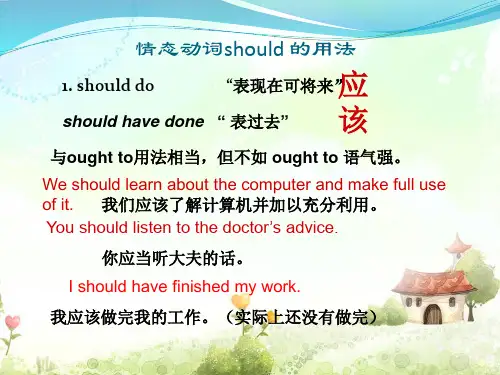
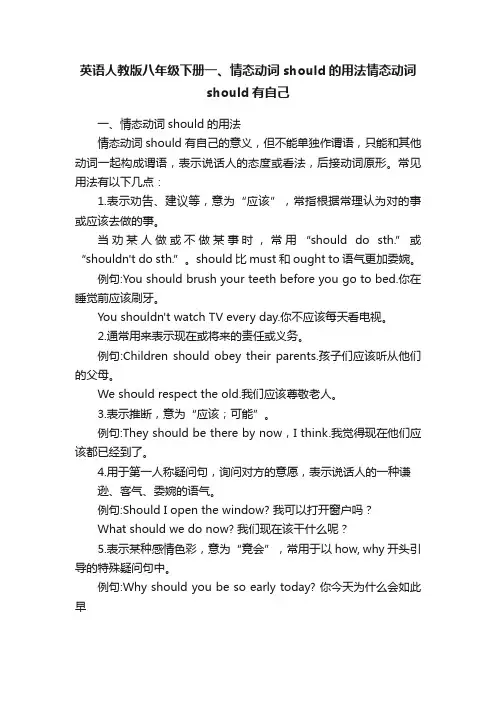
英语人教版八年级下册一、情态动词should的用法情态动词should有自己一、情态动词should的用法情态动词should有自己的意义,但不能单独作谓语,只能和其他动词一起构成谓语,表示说话人的态度或看法,后接动词原形。
常见用法有以下几点:1.表示劝告、建议等,意为“应该”,常指根据常理认为对的事或应该去做的事。
当劝某人做或不做某事时,常用“should do sth.”或“shouldn't do sth.”。
should 比must 和ought to 语气更加委婉。
例句:You should brush your teeth before you go to bed.你在睡觉前应该刷牙。
You shouldn't watch TV every day.你不应该每天看电视。
2.通常用来表示现在或将来的责任或义务。
例句:Children should obey their parents.孩子们应该听从他们的父母。
We should respect the old.我们应该尊敬老人。
3.表示推断,意为“应该;可能”。
例句:They should be there by now,I think.我觉得现在他们应该都已经到了。
4.用于第一人称疑问句,询问对方的意愿,表示说话人的一种谦逊、客气、委婉的语气。
例句:Should I open the window? 我可以打开窗户吗?What should we do now? 我们现在该干什么呢?5.表示某种感情色彩,意为“竟会”,常用于以how, why开头引导的特殊疑问句中。
例句:Why should you be so early today? 你今天为什么会如此早。
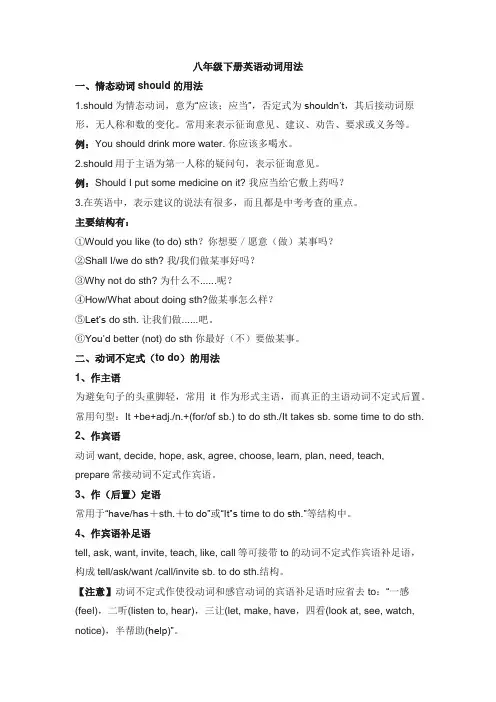
八年级下册英语动词用法一、情态动词should的用法1.should为情态动词,意为“应该;应当”,否定式为shouldn’t,其后接动词原形,无人称和数的变化。
常用来表示征询意见、建议、劝告、要求或义务等。
例:You should drink more water. 你应该多喝水。
2.should用于主语为第一人称的疑问句,表示征询意见。
例:Should I put some medicine on it? 我应当给它敷上药吗?3.在英语中,表示建议的说法有很多,而且都是中考考查的重点。
主要结构有:①Would you like (to do) sth?你想要/愿意(做)某事吗?②Shall I/we do sth? 我/我们做某事好吗?③Why not do sth? 为什么不......呢?④How/What about doing sth?做某事怎么样?⑤Let’s do sth. 让我们做......吧。
⑥You’d better (not) do sth 你最好(不)要做某事。
二、动词不定式(to do)的用法1、作主语为避免句子的头重脚轻,常用it作为形式主语,而真正的主语动词不定式后置。
常用句型:It +be+adj./n.+(for/of sb.) to do sth./It takes sb. some time to do sth.2、作宾语动词want, decide, hope, ask, agree, choose, learn, plan, need, teach,prepare常接动词不定式作宾语。
3、作(后置)定语常用于“have/has+sth.+to do”或“It‟s time to do sth.”等结构中。
4、作宾语补足语tell, ask, want, invite, teach, like, call等可接带to的动词不定式作宾语补足语,构成tell/ask/want /call/invite sb. to do sth.结构。
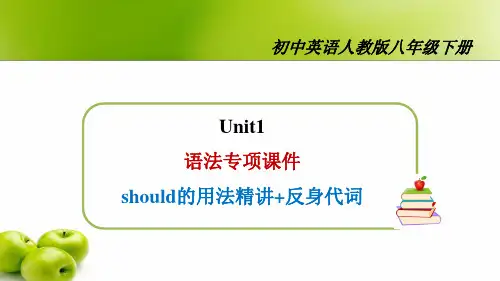
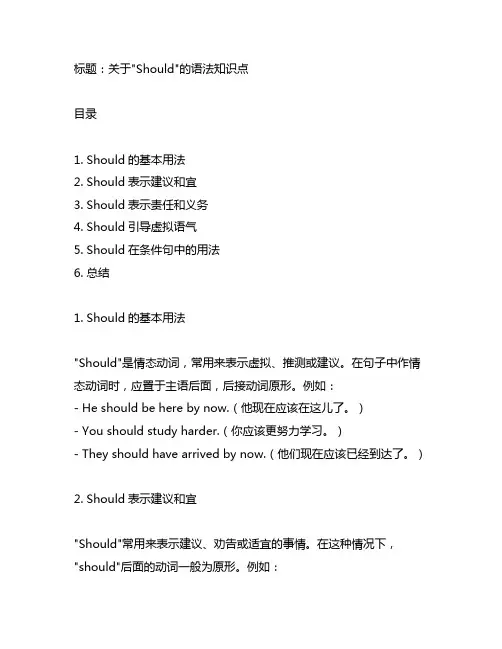
标题:关于"Should"的语法知识点目录1. Should的基本用法2. Should表示建议和宜3. Should表示责任和义务4. Should引导虚拟语气5. Should在条件句中的用法6. 总结1. Should的基本用法"Should"是情态动词,常用来表示虚拟、推测或建议。
在句子中作情态动词时,应置于主语后面,后接动词原形。
例如:- He should be here by now.(他现在应该在这儿了。
)- You should study harder.(你应该更努力学习。
)- They should have arrived by now.(他们现在应该已经到达了。
)2. Should表示建议和宜"Should"常用来表示建议、劝告或适宜的事情。
在这种情况下,"should"后面的动词一般为原形。
例如:- You should take a break.(你应该休息一下。
)- We should start early.(我们应该早点开始。
)- She should see a doctor.(她应该去看医生。
)3. Should表示责任和义务"Should"也可以表示责任和义务,通常用于表示某种道德上的义务或应尽的责任。
例如:- You should apologize for your mistake.(你应该为自己的错误道歉。
)- We should help those in need.(我们应该帮助有需要的人。
)- She should have returned the money.(她本应该把钱退还。
)4. Should引导虚拟语气在虚拟语气中,"should"常用来表示主观的推测或建议。
在这种情况下,"should"后面的动词一般为原形。
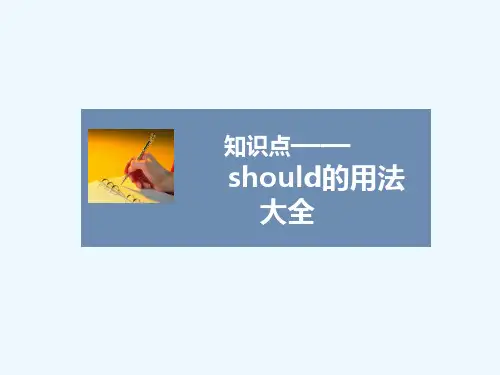
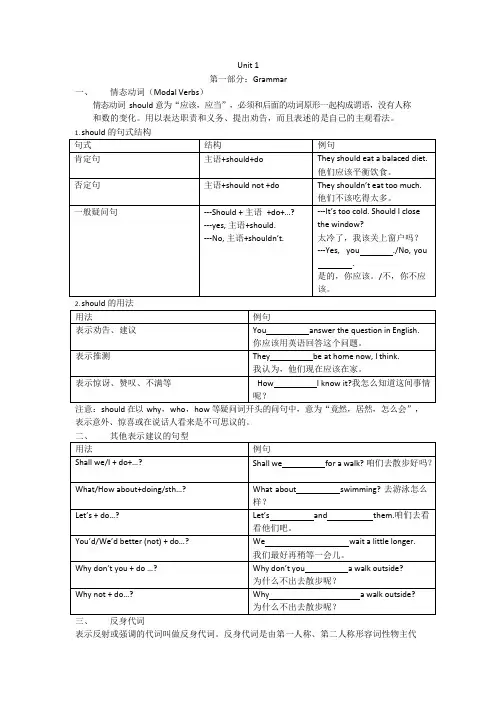
Unit 1第一部分:Grammar一、情态动词(Modal Verbs)情态动词should 意为“应该,应当”,必须和后面的动词原形一起构成谓语,没有人称和数的变化。
用以表达职责和义务、提出劝告,而且表述的是自己的主观看法。
注意:should 在以why,who,how 等疑问词开头的问句中,意为“竟然,居然,怎么会”,表示意外、惊喜或在说话人看来是不可思议的。
三、反身代词表示反射或强调的代词叫做反身代词。
反身代词是由第一人称、第二人称形容词性物主代词或第三人称代词的宾格形式,词尾加self 或selves 组成。
反身代词可译“本人”、“本身”,为加强语气,也常翻译为“亲自”、“自己”。
不定人称代词one ---- o neself.第二部分:单词用法Section A1.What’s the matter?怎么了?该句常用询问某人患了何种疾病或遇到了什么麻烦,其后用with 引出对象。
1). What’s the matter with sb.?=what’s wrong with sb.?=what’s the trouble/problem with sb.?=what’s one’s trouble/problem?e.g. What’s the matter w ith Tom?=what’s with Tom?=What’s the with Tom?=What’s Tom’s?2). matter, 名词,“问题,事情”e.g. We have important (matter) to discuss.我们有些重要的问题要讨论。
3). 动词,“要紧,关系重大”e.g. It dosen’t that you came late.2.I have a cold. 我感冒了。
1).have/get/catch a cold “感冒,着凉”The old man a cold yesterday.那位老人昨天感冒了。
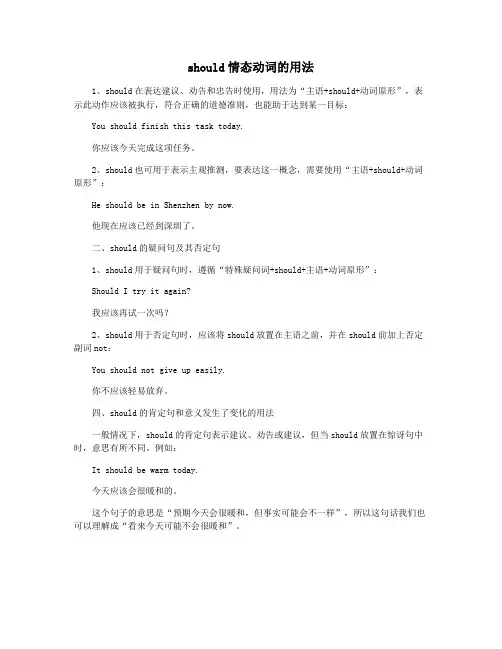
should情态动词的用法
1、should在表达建议、劝告和忠告时使用,用法为“主语+should+动词原形”,表示此动作应该被执行,符合正确的道德准则,也能助于达到某一目标:
You should finish this task today.
你应该今天完成这项任务。
2、should也可用于表示主观推测,要表达这一概念,需要使用“主语+should+动词原形”:
He should be in Shenzhen by now.
他现在应该已经到深圳了。
二、should的疑问句及其否定句
1、should用于疑问句时,遵循“特殊疑问词+should+主语+动词原形”:
Should I try it again?
我应该再试一次吗?
2、should用于否定句时,应该将should放置在主语之前,并在should前加上否定副词not:
You should not give up easily.
你不应该轻易放弃。
四、should的肯定句和意义发生了变化的用法
一般情况下,should的肯定句表示建议、劝告或建议,但当should放置在惊讶句中时,意思有所不同。
例如:
It should be warm today.
今天应该会很暖和的。
这个句子的意思是“预期今天会很暖和,但事实可能会不一样”,所以这句话我们也可以理解成“看来今天可能不会很暖和”。
Unit 1重点知识讲解Grammar一、情态动词(Modal Verbs)情态动词should意为“应该,应当”,必须和后面的动词原形一起构成谓语,没有人称和数的变化。
用以表达职责和义务、提出劝告,而且表述的是自己的主观看法。
1.should的句式结构的用法注意:should在以why,who,how等疑问词开头的问句中,意为“竟然,居然,怎么会”,表示意外、惊喜或在说话人看来是不可思议的。
二、其他表示建议的句型三、反身代词表示反射或强调的代词叫做反身代词。
反身代词是由第一人称、第二人称形容词性物主代词或第三人称代词的宾格形式,词尾加self或selves组成。
反身代词可译“本人”、“本身”,为加强语气,也常翻译为“亲自”、“自己”。
不定人称代词one-----oneself.1、反身代词的分类2、反身代词的用法单词的用法Section A1.What’s the matter怎么了该句常用询问某人患了何种疾病或遇到了什么麻烦,其后用with引出对象。
1). What’s the matter with sb.=what’s wrong with sb.=what’s the trouble/problem with sb.=what’s one’s trouble/problem. What’s the matter with Tom=what’s _________ with Tom=What’s the _________ with Tom=What’s Tom’s _________2). matter, 名词,“问题,事情”. We have important _________(matter) to discuss.我们有些重要的问题要讨论。
3). 动词,“要紧,关系重大”. It dosen’t _________ that you came late.2.I have a cold.我感冒了。
Unit 1 重点知识讲解Grammar一、情态动词(Modal Verbs)情态动词should 意为“应该,应当”,必须和后面的动词原形一起构成谓语,没有人称和数的变化。
用以表达职责和义务、提出劝告,而且表述的是自己的主观看法。
1.should 的句式结构2.s hould 的用法喜或在说话人看来是不可思议的。
二、其他表示建议的句型表示反射或强调的代词叫做反身代词。
反身代词是由第一人称、第二人称形容词性物主代词或第三人称代词的宾格形式,词尾加self 或selves 组成。
反身代词可译“本人”、“本身”,为加强语气,也常翻译为“亲自”、“自己”。
不定人称代词one ---- oneself.1、反身代词的分类2、反身代词的用法单词的用法Section A1.What’s the matter?怎么了?该句常用询问某人患了何种疾病或遇到了什么麻烦,其后用with 引出对象。
1). What’s the matter with sb.?=what’s wrong with sb.?=what’s the trouble/problem with sb.?=what’s one’s trouble/problem?e.g. What’s the matter with Tom?=what’s with Tom?=What’s the with Tom?=What’s Tom’s?2). matter, 名词,“问题,事情”e.g. We have important (matter) to discuss.我们有些重要的问题要讨论。
3). 动词,“要紧,关系重大”e.g. It dosen’t that you came late.2.I have a cold.我感冒了。
1).have/get/catch a cold “感冒,着凉”The old man a cold yesterday.那位老人昨天感冒了。
八年级英语下册语法知识复习1.should 情态动词,应该,应当,用于询问,提出建议,或表达职责和义务。
如:What should I do? You should have a talk with your parents。
could 也可以提出建议,比较委婉.如: You could write him a letter。
could还用于礼貌地请求,如:Could you please clean your room? 否定句式:Could you please not do sth?其他常用情态动词:must必须,have to必须,不得不,may可能,可以,can能,会,可能,可以need需要。
情态动词+动词原形作谓语。
2.非谓语动词形式(一)动词不定式结构:to+动词原形或不带to。
否定:not+to do或not do句法功能:1)主语:常用it作形式主语,不定式为真正的主语:It is +形容词+for sb。
to do sth.It is important to keep fit。
=To keep fit is important.2)宾语:(1)直接宾语:想,喜欢,希望:want,like, love,would like,hope, expect;决定同意拒绝开始学习:decide,agree, refuse, begin,start, learn, 需要计划帮助提供:need, plan,help,offer+ to do(划线的动词还可以接doing)如:I’ll help to clean up the city parks。
(宾语)疑问词(what, who, which,where, when ,how,)+to do 作宾语I don’t know what to say. 我不知道说什么。
(2)宾补:tell,ask,want,wish,allow,invite,help,encourage,teach等+ sb. to do (hope不能接sb。
专题归类复习一
情态动词should与could的用法
●语法讲解
1.should是情态动词shall的过去式,但有时并不表示过去。
(1)表示委婉的劝告或建议,意为“应该”。
如:
You should hand in your composition at once.
你应该立刻交上你的作文。
(2)表示可能性或推断,意为“可能;应该”。
如:
I think they should be there now.
我想他们现在应该在那里。
(3)用于特殊疑问句中,表示意外、惊奇、不能理解等强烈感情。
如:How should you know that?
你是怎么知道那件事的?
What should you do to relax?
你该做什么来放松呢?
2.could是情态动词can的过去式,但有时并不表示过去。
(1)表示提议,比can更客气、委婉。
I could do the shopping for you, if you are tired.
如果你累了,我能帮你买东西。
(2)表示请求,语气比can更客气、委婉。
Could you show me the way to the hospital?
你能告诉我去医院的路吗?
●语法精练
Ⅰ.单项选择
( ) students at least one hour
a day for sports.
A.would B.might
C.should D.could
( ) tell me how to get to the post
office?
A.Must B.Need
C.Could D.Should
( )3.—When can I come for the photos? I need them
tomorrow afternoon.
—They________be ready by 12:00.
A.can B.should
C.might D.need
( )4.—Could I borrow your dictionary?
—Of course you________.
A.can B.must
C.should D.will
( ) loves playing
basketball.
A.maybe B.may be
C.may is D.may not
( ) the new traffic law and learn how
to protect ourselves.
A.will B.would
C.shall D.should
( )7.—Could you please help me do my homework?
—.You________do it by yourself.
A.could; may
B.couldn't; should
C.can't; should
D.can't; may
( )8.—How was the youth club last night, Mark?
—It was great .
A.must B.can
C.should D.may
Ⅱ.根据句意用should或could填空
1.Sally________make dumplings by herself when she was only five years old.
2.In school, all the classmates__________get on well with each other.
3.You________call her if you have something important to tell her.
4.You_________not drive after drinking.
5._________I use your mobile phone,please?。